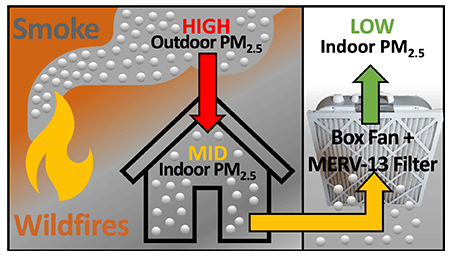
A new paper by group members Dr. Nate May, Clara Dixon, and Dr. Dan Jaffe evaluates the effectiveness of low-cost air filter units during wildfire smoke events. The increased wildland fire activity in the western US in recent years produces high concentrations of fine particulate matter (PM2.5), which negatively affects the health of millions of people. During wildfire smoke events, staying indoors is often recommended. However, how good is indoor air quality during smoke events? The authors looked at PM2.5 measurements from the PurpleAir sensor network, a publicly available network of low-cost air quality sensors located indoors and outdoors. They also analyzed the effectiveness of residential filter units in reducing indoor PM2.5. One low-cost DIY filtration method consists of attaching a Minimum Efficiency Rating Value-13 (MERV-13) fan filter to a standard box fan. This method was found to be highly effective at reducing indoor PM2.5 when recirculating air in a single room.